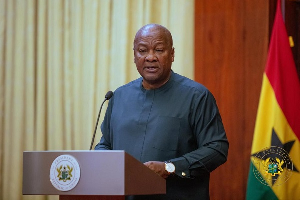Accra, Nov 17, GNA - Resource persons at a media workshop on World Trade Organisation (WTO) Conference and Food Security in Accra on Thursday were of the consensus that there should be a fundamental review of WTO rules so that developing countries could provide domestic support and protect the livelihood of their farmers to promote food security.
They were of the view that the WTO rules as it existed in its current form of trade liberalisation and the agreement on agriculture "are biased against the development interests of developing countries".
Dr Irene Egyiri of the Faculty of Agriculture and Mr Mornah Dekuwmini of the Department of Economics, both of the University of Ghana and Mr Kingsley Ofei- Nkansah, Deputy General Secretary of Ghana Agricultural Workers Union (GAWU) agreed that under the calculated dictates of world trade rules, the consumption of domestic products was being discouraged leading to the inability of the farmer to have market for his produce thus leading to widespread poverty.
Dr Egyiri speaking on; "The Concepts of Food Security - The Situation in Ghana", said the current shift of most Ghanaians from the taste of staple foods to foreign products was becoming a threat to the country's food security.
She said the situation would lead to increase in imports, which would not favour the local agriculture sector as such foods could not be produced in the country.
Dr Egyiri told participants at the workshop sponsored by Action Aid Ghana on the forthcoming World Trade Organisation (WTO) Ministerial Conference to be held in Hong Kong that the current WTO agreements "have everything but equity, balance and fairness".
She mentioned the consumption of rice for example in urban areas, which has led to increase in imports and stressed the need for the Government to strengthen technologies to meet the current trend.
Dr Egyiri said it was only when food was easily accessible, affordable, nutritious and in sufficient quantity that Ghana could be said to be food secured, hence the need to solve the fluctuation problem of agricultural produce that was making it difficult for stability of food prices.
"Government must help District Assemblies to fully implement their policies to influence mobilization of efforts to achieve food security, she said.
Dr Egyiri further called on GAWU and civil society to identify trends and make recommendations to the Government on issues affecting the agricultural industry in the country.
Mr Dekuwmini who spoke on: "The Impact of Trade Liberalisation and Food Security in Ghana", said trade liberalisation did not bring the hoped-for benefits from exports of cocoa and other export crop as expected.
He said the world trade policy had led to a rise in the price of agricultural inputs, loss of agricultural produce, and low domestic consumption that had forced most farmers to sell their produce at cheaper rates.
"Farming is a way of life and survival for the rural communities, he said, adding: "The exploitative activities of private intermediaries, who in pursuing their profit maximization do everything possible to exploit the farmers.
"The farmer is more vulnerable to cheating because he doesn't have accessible alternative markets of direct access to the international market where most of these products are tailored"
Mr Dekuwmini called for common external tariffs and dialogue of member states of ECOWAS in order to protect the livelihood of small holders in the agriculture sector.
Mr Ofei-Nkansah called on the media to support trade unions in their advocacy role to bring to the fore trade and agriculture issues that affected the very survival of society and in fighting hunger and poverty.
"There was the need for cooperation of all to support the union in activities to ensure social justice not only for its members but for the civil society as a whole".
Dr Niyi Alabi, Media Consultant, said issues bordering on agriculture had not received much coverage from the media, adding that it was about time it formed part of the media agenda.
General News of Thursday, 17 November 2005
Source: GNA
















